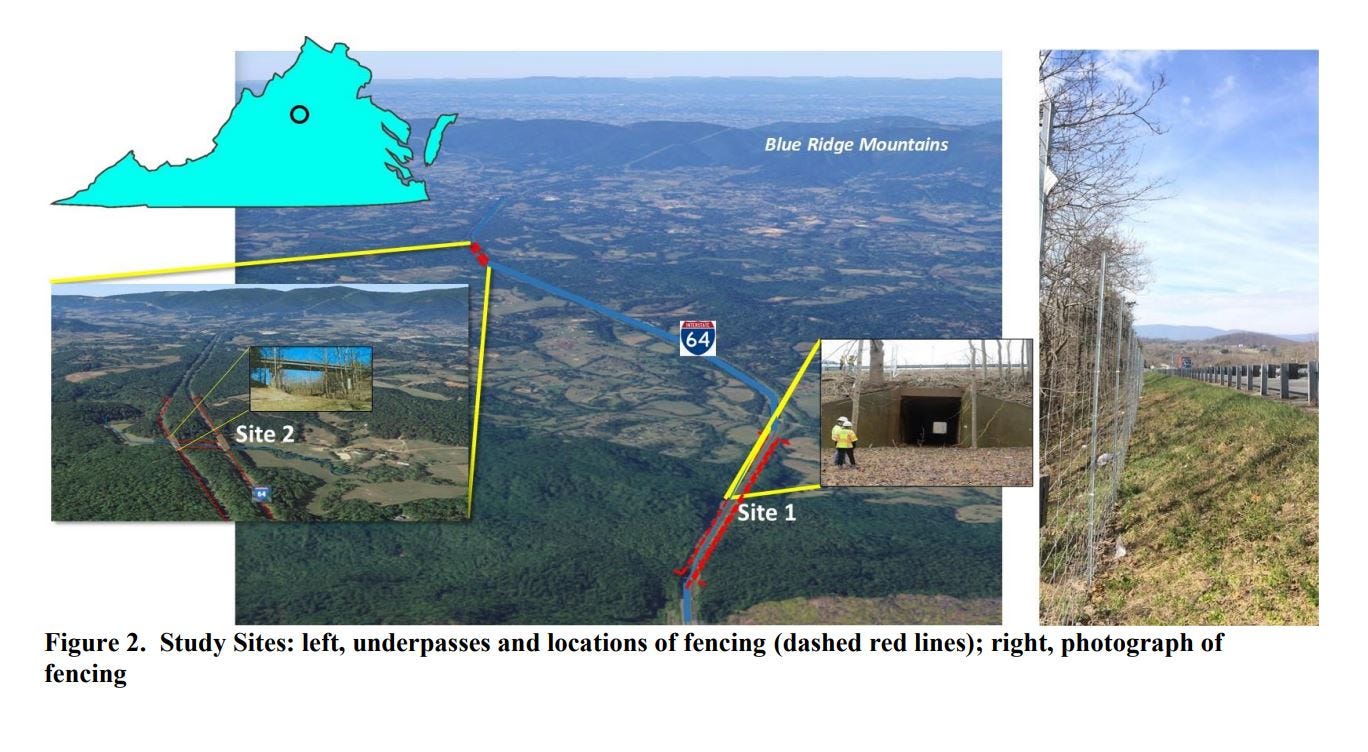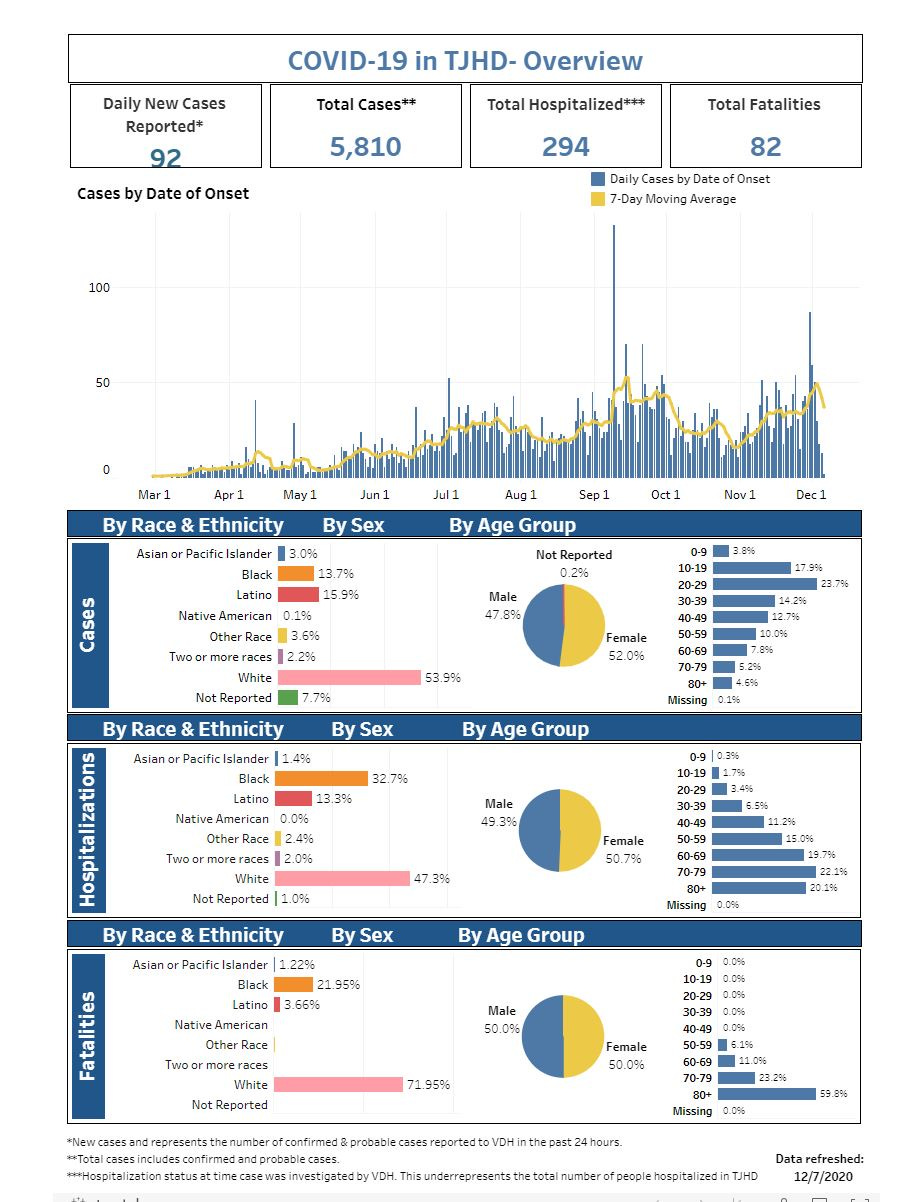In today’s Patreon fueled shout-out: The Local Energy Alliance Program, your local energy nonprofit, wants to help you lower your energy bills, make your home more comfortable, and save energy. Schedule your Home Energy Check-Up to get started - now only $45 for City of Charlottesville and Albemarle County residents. You’ll receive energy-saving products and expert advice customized to your needs. Sign up today!
In today’s newsletter:
COVID cases are surging across Virginia
Virginia Department of Health prepares to distribute vaccines
Virginia Republicans select a method to nominate statewide candidates
A quick look at wildlife crossings
The statewide seven-day average for new daily cases of COVID-19 is at 3,005 today. On Saturday, the Virginia Department of Health reported 3,793 new cases, but there was a caveat that that figure included backlogged numbers. No such caveats were in place yesterday and today, with daily counts of 3,880 and 3,817 respectively. The percent positivity has increased to 10.8 percent, up from 7.4 percent on Thanksgiving Day.
The seven-day average for new daily cases in the Blue Ridge is now at 67, after a district record was set on Saturday with 106 followed by 102 yesterday and 92 today. Percent positivity is at 4.8 percent.
*
The Virginia Department of Health announced late Friday that the Commonwealth is slated to receive 480,000 vaccine doses by the end of December. These will consist of shots from both Pfizer and Moderna.
“This initial distribution will ensure 480,000 health care personnel (HCP) and long-term care facility (LTCF) residents receive a first dose of the vaccine, beginning the inoculation process for nearly all members of Virginia’s two top-priority groups, if we receive this expected allotment,” reads a press release.
The first vaccine to ship is expected to be from Pfizer, which requires ultracold storage down to negative 70 degrees Celsius and the 72,150 doses will be slated for health care workers who directly care for COVID-19 patients.
Those in long-term care facilities will be administered shots by teams working with Walgreens and CVS through a federal partnership run by the Centers for Disease Control.
“The actual amount of vaccine received in Virginia is a moving target and dependent on when and how quickly vaccination doses are manufactured,” the release continues. “VDH is coordinating future prioritization based on federal guidance.”
For more information, visit the VDH’s vaccine page.
*
Virginia Republicans will choose their nominee for governor and other statewide offices in next year’s election through an unassembled convention, which means the party will entirely control the process rather than use the state’s electoral mechanism.
In a close vote, the Republican State Central Committee opted against a primary, in which voters would have gone to the polls or voted early to choose a nominee. The motion was introduced by Michael Ginsberg, a representative from Virginia’s 11th Congressional District, who said that a primary might result in a weak Republican candidate.
“I would imagine there will be four to six very strong, very competitive candidates running for Governor next year which means to me I see us heading straight for an iceberg as a party and that iceberg is that we could nominate a candidate that gets 30 to 35 percent of the vote in a primary and that means we’re going to potentially nominate a candidate for whom the Republican party has not voted for,” Ginsberg said.
Ginsberg’s motion initially passed on a vote of 39 to 35. One of those in the minority was Tara Carroll, a representative from the 7th District. She said a primary would be a guaranteed event, whereas a traditional convention might need to be postponed due to COVID.
“I think that it’s a waste of party financial resources and the candidate’s financial and support resources that are better spent in the General Election,” Carroll said. “Additionally I think that conventions can be a very exclusive process that prohibits those of that we need that to have our votes in the General Election. Young parents, military, students, due to time, financial and travel constraints.”
Due to uncertainty related to COVID-19, Republicans acknowledged they could not hold a convention, but did not want the state of Virginia to administer the elections. Steve Troxell is a representative from the 6th Congressional District.
“I like the idea of an unassembled convention because that takes care of the issues of people with small children simply because all they have to do is come through, take care of business, and go away again,” Troxell said. “I’m also concerned about the inability of a lot of registrar’s offices to guarantee that we have a clean election without a lot of spurious or questionable votes coming in.”
Two Republicans from the General Assembly have announced their candidacy. They are former Speaker of the House of Delegates Kirk Cox and Senator Amanda Chase, but Chase has announced she will now run as an independent.
*
One way to ensure and promote biodiversity is to reduce the number of animals that die when they’re struck by vehicles moving at high speed. A recent video of an overpass crossing Interstate-80 in Utah recently went viral, raising awareness of an infrastructure movement that’s taking hold across America. Susan Holmes is the federal policy director of the U.S. Wildlands Network.
“Wildlife corridor protection is so effective that 12 states, including Virginia and New Mexico, have already taken strong action to safeguard wildlife corridors and crossings by passing legislation or creating corridor conservation programs,” Holmes said.
Earlier this year, the General Assembly passed a bill introduced by Delegate David Bulova (D-Fairfax) to create a Wildlife Corridor Action Plan for the state. This plan is to “identify wildlife corridors, defined as areas connecting fragmented wildlife habitats that are separated by human activities or infrastructure, and recommend wildlife crossing projects intended to promote driver safety and wildlife connectivity.”
But where should they go? Dr. Ron Sutherland is the chief scientist at the Wildlands Network and he has this explanation.
“A wildlife crossing is a structure that is designed to allow wildlife to safely cross under or over a busy road,” Sutherland said. “One of the best places to put wildlife road crossings is of course where you have a wildlife corridor that gets cut off by a highway.”
“As you know, roads are pretty much everywhere and roads are quite skilled at fragmenting wildlife habitat,” said Bridget Donaldson, a scientist at the Virginia Transportation Research Council at the University of Virginia. She and her colleagues installed a pilot project on Interstate 64 west of Charlottesville that used fencing to direct creatures to an underpass. Her research indicates that the intervention reduced collisions by 90 percent.
“These kinds of numbers have been shown time and again with wildlife crossing research, with effectiveness of between 85 percent and as much as 97 percent,” Donaldson said.
Donaldson said so far wildlife crossings are rare, but increased efforts to report carcasses has shown better data that can demonstrate their efficacy.
“And because of the crash reduction that we saw of over 90 percent, and because of the relatively low cost of the fencing, there’s an estimated savings mostly from vehicle property damage at each of those sites of over $2 million over the lifetime of the fencing,” Donaldson said.
Donaldson said thousands of animals now use the crossings, including black bears.

Today in meetings:
The Albemarle Architectural Review Board meets at 1 p.m. and will review a new Sheetz at Airport Road, a preliminary site plan for the Albemarle Business Campus, and a new car was near Forest Lakes.
Charlottesville City Council meets at 6-30 p.m. and among other things will consider a proposal for a city in western Guatemala to become the next sister city. Check out the Week Ahead newsletter to learn more details.
Thank you for reading! To pay for all of this, I have launched a new business called Town Crier Productions in order to make a living as I go about my work researching public policy in our community. You can help me by making a contribution:
Support my research by making a donation through Patreon
Sign for a subscription to Charlottesville Community Engagement, free or paid















Share this post